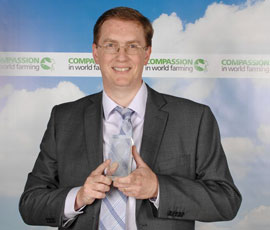Good egg and chicken awards reward welfare

Animal welfare group Compassion in World Farming has announced the winners of its annual Good Farm Animal Welfare Awards, recognising the egg and poultry sector with “Good Egg” and “Good Chicken” Awards.
The awards were presented to egg producers, food manufacturing companies and other organisations at the Freemasons’ Hall in Covent Garden during the first week of July.
Waitrose was the biggest winner on the night, winning the most compassionate supermarket over all categories of welfare for the second year running.
Other notable egg and food companies taking away Good Egg Awards were The Happy Egg Company, Rail Gourmet, Clarence Court Eggs, Aramark, Baxter Storey, Cook Trading Ltd, Creed Food Service, Holroyd Howe Independent, Laverstoke Park Farm, Mr Kipling, Pabulum, Rail Gourmet, Stokes Sauces and Ocado.
Steve Horton, marketing director at The Happy Egg Company, said the award recognised the company’s dual achievements of keeping welfare high while growing the brand.
“We have had a fantastic year, with the brand growing over 85% in the last 12 months showing how consumers have bought into the brand, but more importantly to the free-range category as a whole, which continues to go from strength to strength,” he said.
Other winning companies, who have all committed to using only free-range eggs in their catering and office canteens, were Cygnet and Napp Pharmaceuticals, Heineken, London 2012 Olympic Games, IKEA UK and ISS Education.
Good Chicken Awards, for poultrymeat production, were won by Lake House Table, The National Trust, Packington Poultry, The Black Farmer and Traditional Norfolk Poultry.
Ed Olphin, managing director at Lake House Table, producing broiler birds, said they were happy to receive the award recognising a shared philosophy with CiWF.
“Our Free Range Chicken is high welfare and comes from Norfolk, and it has taken months for us to source the quality and welfare credentials which meet our exacting standards,” Mr Olphin said. “Food is more about values than volume. Farm welfare should never be an optional extra.”
